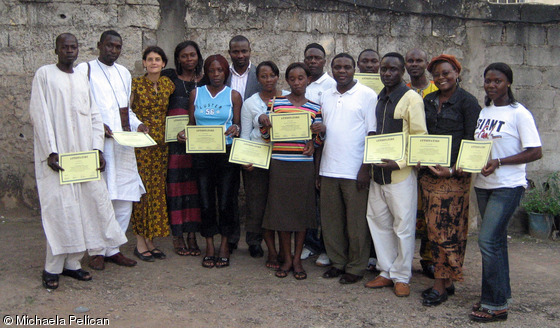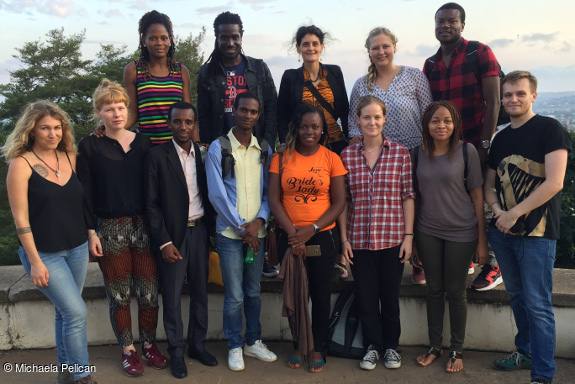Collaborations
Over the past years, I have engaged in a number of collaborative projects. These include comparative work with former colleagues at the Max Planck Institute of Social Anthropology in Halle/Saale, research and teaching collaborations with colleagues at the University of Cologne, as well as collaborative research and publications with colleagues in Africa, Asia, and Latin America.
Global South Studies Center Cologne (GSSC)
Since 2014, I am a member of the Global South Studies Center Cologne (GSSC). Here I have engaged in a number of collaborative endeavours, including the organization of workshops, joint research and publications. For example, I have worked together with Prof. Dr. Sabine Damir-Geilsdorf (Department of Middle Eastern and Southeast Asian Studies) on migration and labour regimes in the Arab Gulf States, as well as with Prof. Dr. Bjoern Ahl (Department of Chinese Studies) in the project 'Chinese Immigration Law and Policy: Perspectives of lawmakers, administrators and immigrants'. In this context, I have also collaborated with the members of the international research consortium 'Immigration in China' , as well as with colleagues at Sun Yat-sen University (SYSU) in Guangzhou, namely Prof. Dr. Li Xi Yuan (Centre for the Studies of Hong Kong, Macao and Pearl River Delta) and Prof. Dr. Li Zhigang (Department of Geography and Urban Planning, formerly SYSU, now Wuhan University).
In addition, I am a member of the Thematic Network "Remapping the Global South - Teaching, Researching, Exchanging" of the GSSC. The Thematic Network facilitates cooperation in research and teaching between the partner universities, which include the University of Cologne, the Universidad Nacional de San MartÃn in Buenos Aires, the University of the Western Cape in Cape Town, the Jawaharlal Nehru University in Delhi, and Sun Yat-sen University in Guangzhou. In this context, Dr. Oliver Tappe and I organised the field school on 'Africa-Asia connections' in Cape Town in 2017, which resulted in return visits and enduring contacts between students and colleagues of the Universities of Cologne and the Western Cape.
UoC Forum 'Ethnicity as a Political Resource'
From 2013 to 2016, I was the director of the University of Cologne (UoC) Forum "Ethnicity as a Political Resource: Perspectives from Africa, Latin America, Asia, and Europe". The UoC Forum included nine researchers from the Departments of Cultural and Social Anthropology, Iberian and Latin-American History, and African Studies. Our objective was to strengthen the interdisciplinary and international dialogue on the formation of ethnic identities and their use as a political resource in diachronic and comparative perspective.
In this context we organised three major international conferences in Cologne and Guangzhou (2014, 2015). The second was realised together with the Center of Urban Studies of Sun Yat-sen University in Guangzhou, and centered on ethnicity in the context of migration and state policies.
In addition, the UoC Forum organised a number of thematic workshops, as well as an exhibition and panel discussion the the Spanish border town Melilla which resulted from our collaboration with the participatory social action and research project 'Kahina'.
Among the outcomes of the UoC Forum were two joint publications: The thematic issue 'Melilla - perspectives on a border town') (2017), as well as the edited volume "Ethnicity as a Political Resource - Conceptualizations across Disciplines, Regions, and Periods" (Transcript, 2015). The latter includes theoretically and empirically oriented short essays, suitable for teaching, and has been made open acces (click on 'Volltext PDF').
Ethnographie vor der Haustür / Ethnography at home
'Ethnographie vor der Haustür' (Ethnography at home) is an interdisciplinary research and teaching programme that Prof. Dr. Sabine Damir-Geilsdorf (Department of Middle Eastern and Southeast Asian Studies) and I initated in 2013. It runs over two semesters and includes a preparatory seminar; followed by ethnographic fieldwork during the summer break; and a concluding seminar geared towards data analysis, write-up, and methodological reflection.
The programme has tackled a variety of research topics and has produced a number of outcomes, including public lectures and poster presentations, the special issue Islam and Sport, and the podcast series Research, Action, and Art.
During the past three years (2016-2019), the programme has focused on the situation of refugees from the Middle East in Germany. Among other topics, student participants have studied changing family and friendship arrangments in the context of forced migration. The results of their research will be published in a special issue on family and forced migration in German/English and in Arabic translation.
Collaborative research programmes with colleagues and students in Cameroon (2007 / 2018)

University of Yaounde I, 2007
The issue of Cameroonians' urge for international migration and the possible impact of Cameroonian migrants on their home communities was the subject of a collaborative research project involving three anthropologists and ten graduate students of the University of Zurich (Switzerland) and the University of Yaoundé 1 (Cameroon). The project was conducted in Cameroon in July to September 2007 and entailed a one-week preparatory seminar, four weeks of field research and one week of data analysis. The project was generously supported by the Swiss National Science Foundation and the Laboratoire CASS-RT in Yaoundé.
The focus of the project was on transnational relations of Cameroonian migrants within the Global South, and the perception of these relations by members of the migrants' communities of origin. We centred our investigations on three regional clusters: While a first team focused on intra-African migration, a second engaged with the migration of Muslim Cameroonians to Arab countries, and a third researched Chinese-African exchange relations. All three teams collected data on the motives of migration, preferred destinations, networks of migration, the role of the family in the migration enterprise, communication and exchange relations between migrants and their relatives and friends at home, as well as the perception of migrants in their host and home countries. In order to diversify our findings, we conducted research in three locations, i.e. in the two major cities Yaoundé and Douala in francophone Cameroon, and in Bamenda and its rural surroundings in the Anglophone part of the country. The results of the research were published in: Pelican, Michaela and Peter Tatah and Basile Ndjio. 2008. Local perspectives on transnational relations of Cameroonian migrants. African Sociological Review 12(2): 117-127.
In summer 2018, I organised a follow-up research in collaboration with colleagues from the Universities of Yaoundé 1, Bamenda, and Dschang on the theme of 'Urban youths' perspectives on making a future in Cameroon and/or abroad'. For six weeks, twelve students from Cameroon and Cologne conducted fieldwork in Yaoundé on the subject of future making under conditions of uncertainty, forming German-Cameroonian research tandems, and tackling it from different angles. They focused on the strategies of young artists and journalists, the experiences of female university graduates in the labour market, the gendered trajectories of educated men and women of the Mbororo minority, the challenges faced by un/successful return migrants, and the contributions to youth development by migrant investors and home town associations. The results of our joint research will be published in the thematic issue 'Urban Youth and Future Making in Cameroon'.


